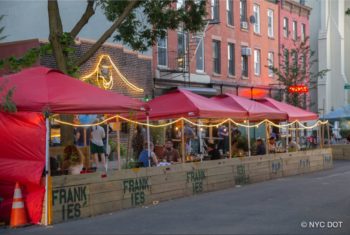
Image Credit: NYC DOT.
On October 4, 2022, the Appellate Division, First Department ruled in favor of the City in its appeal challenging a February Supreme Court ruling that halted the City’s development of the permanent open restaurants program.
The temporary open restaurants program was established in response to the COVID-19 pandemic, and allowed restaurants to occupy sidewalk and roadway spaces for outdoor dining without going through the approval process from the Department of Consumer and Worker Protection. At the time of this article, over 12,000 restaurants citywide have participated in the program. The temporary open restaurants program has been credited with saving approximately 100,000 jobs citywide. As the temporary program was established through emergency executive orders, the City would need to take multiple steps to make the program permanent.
This past February, the City Council approved a zoning text amendment that removed geographic restrictions on where sidewalk cafes could operate within the City. Prior to the temporary program, there were approximately 1,100 sidewalk cafes in operation citywide, but the cafes were predominately in Manhattan. Zoning restrictions limited the ability of many neighborhoods in outer boroughs to operate sidewalk cafes at all.
Once the zoning text amendment passed, the City Council would then need to pass legislation to transfer the authority over sidewalk cafes to the Department of Transportation and other relevant agencies away from just the Department of Consumer and Worker Protection. After that legislation would pass, then agencies would need to create the rules that would establish the program.
Despite its success in preserving jobs, many have continued to criticize the quality of life issues created by the program, including noise, trash, disorderly patrons on the street, rats going after the food and hiding under dining shelters, and the use of public parking spaces to benefit private businesses. Some felt that the Department of Transportation was not doing enough to address complaints or quality of life issues.
After the City Council passed the zoning text amendment, a group of residents who opposed the open restaurants programs filed a lawsuit, challenging the passage of the zoning text amendment without a proper environmental review required by state law, which usually requires taking a “hard look” at environmental impacts including noise, rodents, traffic, and sanitation for actions that affect 25 or more acres, like the citywide open restaurants program. The City filed a motion to dismiss on ripeness grounds, but the motion was denied.
In the February decision, New York County Supreme Court Judge Frank Nervo agreed with the residents, finding that the state’s environmental law “mandates the preparation of an environmental impact statement where a proposed project ‘may have a significant effect on the environment.’” Judge Nervo found the City’s issuance of a negative declaration that the dining program would not have a significant impact without performing an environmental impact study or soliciting public comment was unlawful. Judge Nervo also found that the determination would have been an “impermissible pre-judgment,” as the program had not been fully developed at the time of the issuance of the negative declaration.
As a result of this ruling, the City had to pause its efforts in creating the permanent program.
The City appealed, and on October 4, 2022, the Appellate Division, First Department overturned the lower court’s decision. The Appellate Division ruled that the City’s motion to dismiss on ripeness grounds should have been granted. The court reasoned that since there were still additional legislative and administrative steps to be taken and the program was not finalized, the negative declaration issued did not inflict “actual, concrete injury.” As there was no actual injury, it was not the appropriate time for the residents to bring the lawsuit. The court did not address the content of the residents’ suit given that the timing was not right. This decision does not block the residents from filing another suit at an appropriate time in the future.
With the lawsuit dismissed, the City can now proceed with the additional legislative and administrative steps required to create a permanent open restaurants program.
CityLand reached out to the Law Department and Council Member Marjorie Velazquez, Chair of the Committee for Consumer Protection who is sponsoring the permanent open restaurants legislation, for comment. Council Member Velazquez’s office declined to comment. A spokesperson for the Law Department stated, “We are pleased the court dismissed this meritless case.”
CityLand will continue to follow the developments regarding the open restaurants program.
By: Veronica Rose (Veronica is the CityLaw fellow and a New York Law School graduate, Class of 2018.)


F this program. Leave the streets alone. Ridiculous that the DOT is involved with any sort of restaurant or “entertainment” business. What a slap in the face to NYers that supported these private businesses during a hard time, only for them to try to take over!